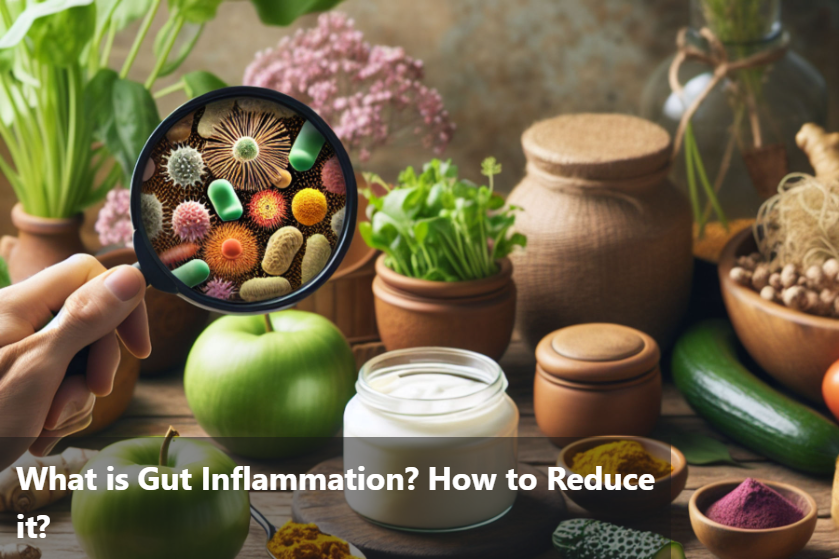
What is Gut Inflammation? How to Reduce it?
Share
Gut inflammation is a pathological condition characterized by immune activation within the gastrointestinal tract. It is associated with various disorders, including inflammatory bowel disease (IBD), irritable bowel syndrome (IBS), and metabolic syndrome. This article explores the causes, pathophysiology, clinical manifestations, and evidence-based strategies for reducing gut inflammation. Emphasis is placed on dietary modifications, lifestyle interventions, and emerging therapeutic approaches.

What is Gut Inflammation
Gut inflammation occurs when the immune system overreacts to internal or external stimuli, leading to chronic irritation of the intestinal lining. This condition can disrupt the gut microbiome, impair nutrient absorption, and contribute to systemic inflammation. While acute inflammation is a natural immune response, chronic gut inflammation is linked to multiple diseases, including Crohn’s disease, ulcerative colitis, and even neurological disorders through the gut-brain axis.
Understanding the underlying mechanisms of gut inflammation and adopting strategies to mitigate it can improve gastrointestinal and overall health.
Causes of Gut Inflammation
Several factors contribute to gut inflammation, including:
Dietary Factors: Processed foods, excessive sugar, artificial additives, and trans fats can trigger an inflammatory response.
Dysbiosis: An imbalance in gut microbiota reduces the population of beneficial bacteria, allowing harmful bacteria to thrive.
Food Intolerances and Allergies: Gluten, dairy, and other food sensitivities can trigger immune reactions leading to inflammation.
Chronic Stress: Psychological stress impacts the gut-brain axis, leading to increased intestinal permeability and inflammation.
Infections and Toxins: Bacterial, viral, and fungal infections, as well as environmental toxins and pesticides, can contribute to inflammation.
Autoimmune Responses: Conditions such as Crohn’s disease and ulcerative colitis involve an overactive immune response against gut tissue.
Underlying Causes and Processes of Gut Inflammation
The inflammatory process in the gut typically involves:
Mechanism |
Description |
|---|---|
Disruption of the Gut Barrier |
Increased intestinal permeability (leaky gut) allows endotoxins and antigens to enter the bloodstream, triggering immune activation. |
Cytokine Release |
Pro-inflammatory cytokines (TNF-α, IL-6, IL-1β) are released, promoting inflammation and tissue damage. |
Microbiome Dysregulation |
Loss of microbial diversity weakens the gut’s ability to regulate immune responses. |
Oxidative Stress |
Increased free radicals contribute to cellular damage and prolonged inflammation. |
Clinical Signs and Symptoms
Gut inflammation presents with a variety of symptoms, including:
Abdominal pain and cramping
Diarrhea or constipation
Bloating and gas
Fatigue and brain fog
Unexplained weight loss or gain
Joint pain and systemic inflammation
Left untreated, chronic gut inflammation may contribute to serious conditions such as autoimmune diseases, metabolic disorders, and neurological impairments.
Strategies to Reduce Gut Inflammation
Dietary Approaches
Anti-Inflammatory Diet: Prioritize whole foods, including fruits, vegetables, lean proteins, and healthy fats (omega-3s from fish, flaxseeds, and walnuts).
Elimination of Trigger Foods: Identify and remove gluten, dairy, refined sugars, and processed foods if they exacerbate symptoms.
Probiotics and Prebiotics: Fermented foods (yogurt, kimchi, kefir) and fiber-rich foods (garlic, onions, bananas) support beneficial gut bacteria.
Polyphenol-Rich Foods: Green tea, berries, and dark chocolate provide antioxidants that mitigate oxidative stress.
Adequate Hydration: Drinking sufficient water supports digestion and reduces inflammation.
Lifestyle Interventions
Stress Management: Mindfulness, yoga, and meditation help regulate the gut-brain axis and reduce cortisol levels.
Regular Exercise: Moderate physical activity enhances gut motility and microbiome diversity.
Adequate Sleep: Poor sleep alters gut microbiota and increases systemic inflammation.
Intermittent Fasting: Can promote autophagy and reduce inflammatory markers in the gut.
Avoiding Unnecessary Antibiotics: Overuse of antibiotics disrupts gut microbiota and promotes dysbiosis.
-
Weight Loss: Maintaining a healthy weight can significantly reduce gut inflammation by lowering systemic inflammatory markers and improving gut microbiome diversity.
Elevate Now offers science-backed, doctor-supervised weight loss solutions, helping users achieve a 15-18% reduction in body weight within six months. Unlike traditional methods, it addresses medical factors like metabolism and inflammation for lasting results.
How It Works
Root Cause Analysis – Identifies key factors behind weight gain.
Doctor-Guided Treatment – Includes medications like GLP-1, SGLT2 inhibitors, Orlistat, and Metformin.(check eligibility)
Personalized Coaching – Covers nutrition, fitness, sleep, and stress management.
Sustainable Results – A holistic approach for long-term weight management.(read more)

Emerging Therapies
Fecal Microbiota Transplantation (FMT): Shows promise in restoring microbiome balance in severe dysbiosis cases.
Microbiome-Based Supplements: Postbiotics and next-generation probiotics are being explored for targeted therapy.
Anti-Inflammatory Medications: Certain biologics and immunosuppressants are used for severe IBD cases.
Summary
Gut inflammation is a widespread issue with implications beyond digestive health. Chronic inflammation contributes to systemic diseases and disrupts overall well-being. Addressing gut inflammation requires a multifaceted approach, including dietary modifications, stress management, lifestyle changes, and emerging medical therapies. By adopting an anti-inflammatory lifestyle, individuals can improve gut integrity and reduce the risk of associated health conditions.
FAQs
1. What are the primary symptoms of gut inflammation?
Common symptoms include bloating, abdominal pain, diarrhea, constipation, and fatigue. Chronic cases may involve systemic inflammation affecting joints and mental clarity.
2. Can gut inflammation be reversed?
Yes, gut inflammation can be managed and often reversed through dietary changes, stress management, and probiotic supplementation.
3. What foods should I avoid to reduce gut inflammation?
Processed foods, refined sugars, artificial sweeteners, trans fats, and gluten-containing products can contribute to gut inflammation and should be minimized.
4. How long does it take to heal an inflamed gut?
The time required for healing varies, but noticeable improvements can be seen within weeks of implementing anti-inflammatory strategies, with full recovery taking months.
5. Do probiotics help with gut inflammation?
Yes, probiotics can help restore microbial balance, reduce inflammation, and improve gut barrier function, especially when combined with a prebiotic-rich diet.
